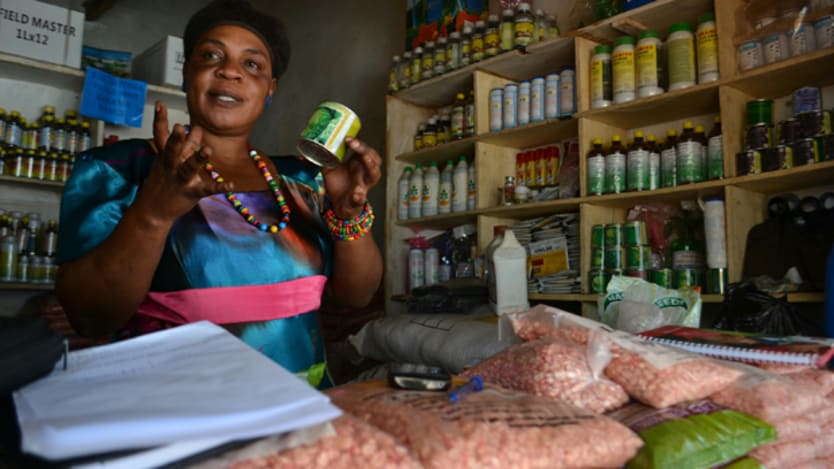
In recent years, governments, foreign aid donors and their implementing partners have made a noticeable shift in efforts to integrate the poorest of the poor into commercial value chains, with the goal of improving food security, health and livelihoods.
The tenets of the U.S. Feed the Future initiative and the New Alliance for Food Security & Nutrition include an increased focus on innovation, leveraging private capital and aligning foreign investment with national policy objectives. These have become dominant themes in development programming, and rightly so. Though some of this sharpened focus came about as a result of diminished resources during the financial crisis, it just makes good sense to identify partners with common goals, coordinate efforts, ensure country buy-in and promote low-cost advancements in technology or practices that can jumpstart growth.
See more #FeedingDev articles:
• Enterprises designed to serve the smallholder farmer
• Linking up for a food-secure world
• How Africa can help feed the world’s 9 billion people in 2050
One of the main challenges, however, remains largely the same as it has always been: how to sustainably deliver training, information, technology, financing and market linkages to the smallholders at the bottom of the pyramid. If we accept that project-driven initiatives are short-term fixes and not generally sustainable, the goal becomes to first demonstrate that doing business with smallholders can be profitable. Then it is crucial to build the capacity of the local, small and medium-sized enterprises, or the “missing middle,” to provide goods and services that link those smallholders with markets, capital and suppliers at the top of the pyramid.
In addition to increasing overall production and productivity, Tetra Tech’s approach to holistic agricultural value chain development — recently tried and tested in USAID projects in Colombia, Uganda, Macedonia and Kosovo — focuses on building the private sector capacity within the “missing middle.” In Uganda, Tetra Tech is supporting the U.S. Agency for International Development in formalizing linkages between input suppliers and wholesale dealers, and building win-win business relationships between input dealers and village-based sales agents to facilitate “last-mile initiatives” that make quality agricultural inputs more accessible to rural farmers. In Kosovo, we are helping to establish and expand the number of collection, sorting and grading centers. We are building their capacity to engage in both upstream and downstream formal contractual relationships with farmers, supermarkets and wholesale traders. We are also working closely with commercial banks to make them more aware of bankable opportunities within the agriculture sector and to link them to credit-worthy agribusinesses.
The lack of this service, distribution, or supply chain infrastructure often constrains private investment and deters potential international agribusiness partners from entering developing markets or expanding beyond the “low-hanging fruit” offered by commercial clients and suppliers. Still, too often the term “middlemen,” used to refer to local SMEs, is thrown about as a dirty word, with their role being seen as exploitative. They are blamed for everything from counterfeiting to price gouging. In practice, these SMEs provide trade credit, training, retail goods and services and linkages to cash markets that would not otherwise be available to their communities. They are most often members of the communities they serve, with a vested interest in maintaining a positive reputation and building a base of successful local clients.
While there are certainly unscrupulous operators out there and there is considerable room for strengthening producer organizations, regulatory agencies and value chain governance to ensure that economic returns are fairly shared among value chain participants, to “cut out the middlemen” means to cripple commercial value chain development entirely.
On the contrary, donors must invest in the “missing middle.” SMEs that exist must be strengthened and held up as a model to draw new entrepreneurs into the agricultural service and supply business. To do this, they need improved business and technical skills in order to better serve smallholders and to access finance to grow their businesses and invest in new technology. In addition, SMEs also need improved business-to-business linkages with national and international markets and suppliers in order to fulfill their critical role as a bridge from the bottom up.
These are investments that neither international private sector partners, nor national governments, are likely to make on their own; yet the development of retail supply and distribution systems is the key to opening the door for private sector-led growth in the developing world.
As part of our strategic approach to value chain development, Tetra Tech mitigates suspicion and distrust among business partners — producers, traders, distributors, lenders and others — and validates the role of the “middleman” by providing technical support to industry roundtable discussions, B2B meetings and buying missions. These targeted activities go a long way towards building trust among business partners and cohesion across the value chain. Successful USAID projects in Colombia, Macedonia and Kosovo can attest to the effectiveness of this approach.
Join the conversation with our LinkedIn group!
As we continue to focus on improved smallholder productivity, with an eye to household food security and nutrition, let us remember that sustainable economic development also requires a favorable regulatory and investment environment, with strong participation of private capital at the top of the pyramid and targeted support for the “nation of shopkeepers” that links them together.
Want to learn more? Check out Feeding Development's campaign site and tweet us using #FeedingDev.
Feeding Development is an online conversation hosted by Devex in partnership with ACDI/VOCA, Chemonics, Fintrac, GAIN, Nestlé and Tetra Tech to reimagine solutions for a food-secure future from seed and soil to a healthy meal.
